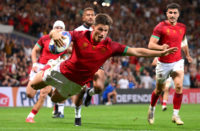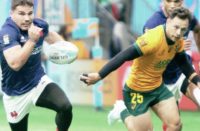 Only five nations on this rugby planet have beaten New Zealand in a Test match in 110 years of trying so perhaps Ireland shouldn't beat themselves up too much over their winless record against the All Blacks. But then again just one draw in 27 Tests does seem an inexplicably barren record for a team that historically relishes the underdog tag and glories in dispensing a bloody nose to the great and good.
Only five nations on this rugby planet have beaten New Zealand in a Test match in 110 years of trying so perhaps Ireland shouldn't beat themselves up too much over their winless record against the All Blacks. But then again just one draw in 27 Tests does seem an inexplicably barren record for a team that historically relishes the underdog tag and glories in dispensing a bloody nose to the great and good.
“We have beaten very good teams from Australia and South Africa and over the years Ireland have claimed victories against highly rated sides from England, France and Wales,” muses former captain Keith Wood. “Somewhere along the line in over 100 years of trying we should surely have beaten New Zealand?
“It's a hurdle we badly need to clear and I'm not just talking about the pleasure and feel-good factor such a historic win would bring to the nation. Its the change of mindset that would follow for Irish rugby with the dam bursting and an outpouring of confidence that would enable our talented players to go up yet another level.
“I would imagine – and I can only guess because obviously I have never experienced it – that after being a member of a winning Test team against New Zealand the rugby world holds no fears. You will look at yourself and your team in a different way. You have conquered the best once, you can do it again. Why ever not?
“Like many other countries I sometimes suspect that one or two Ireland teams have been beaten against New Zealand before they even ran down the tunnel. And if you start questioning your right to be on the same pitch then all is lost.”
Wood appeared in four Tests against the All Blacks for Ireland and can reflect on two painful thumpings and two very fine, but ultimately unsuccessful, Ireland performances in defeat. The closest he ever got to the ‘promsied land' was at Lansdowne Road in November 2001.
Ireland stormed into a 21-7 lead early in the second half and could have gone even further ahead if David Wallace had found another half yard and reached a promising kick ahead first. Instead, New Zealand counter-attacked and scored through Jonah Lomu in the far corner, the start of an impressive comeback.
“For the best part of an hour Ireland played some of the best rugby I have ever been associated with,” said Wood. “We were terrific – dynamic, fast, precise and fearless. You could feel the growing excitement and sense of wonder around the old ground and I've never known a noisier crowd but then we just hit the wall pure and simple. We didn't choke, we just ran out of steam. That ‘hour syndrome' was a big problem with Ireland for a good while and this was the most glaring and costly example.

“We still had the passion and kept tackling as best we could but it was all harum scarum stuff and that will only get you so far against New Zealand. I had just come off a Lions tour to Australia and how we could have done with some of the science and organisation in defence that a Phil Larder brought to proceedings. I was devastated afterwards, we had the match in our hands but let it slip away and it hurt like hell. Still does. I remember thinking that night that Ireland had to somehow find a way of improving our fitness and defence. It had to become a crusade.
“We ran them close again the following year down in Dunedin, although the 15-6 scoreline perhaps doesn't reflect that. We were absolutely in pieces physically after nearly two continuous years of rugby but from somewhere we summoned a really commanding, classy performance. We ‘bossed' that game up front from start to finish but, very unusually, our kicking game let us down a bit and and we let them score two pretty soft tries. Looking back I can see clearly how we lost the 2001 game but that Dunedin match still baffles me.”
New Zealand have made a habit of baffling Ireland over the years, starting in 1905 when Dave Gallaher's “Original” All Blacks cruised to a 5-0 win at Lansdowne Road in the nations' first encounter.
Gallaher, who missed the match with a leg injury, was himself Irish born, hailing from Ramelton in Donegal. The entire family – which numbered nine children at the time – emigrated to Napier when Gallaher was five after his father James took up an appointment as an agent for the Donegal Knitting Company. It proved ill-founded so they moved to Katikati, near Auckland, where his mother, a teacher, was the main breadwinner.
Gallaher wasn't the only member of the 1905 Originals with Irish roots.
Star full-back Billy Wallace recalled in his diary absenting himself soon after the final whistle to catch the last train to Derry, where at 1am on the Sunday morning the only two people waiting on the freezing platform were his 92-year-old grandfather and 88-year-old grandmother. He was meeting both for the first time and after sleeping until 2pm updated them on his father – their son – who they hadn't seen for 30 years or more. Early meetings were few and far between – basically when New Zealand were able to stage a European tour – but succeeding All Blacks continued the winning theme in 1924, 1935 and 1954.
Four matches in 49 years, no wonder the arrival of the New Zealand tourists was a special occasion boasting a real novelty value. Even Willie John McBride, in a 14- year international career, played only three Ireland Tests against the All Blacks.

The first came in 1963 when Ireland really tested the visitors. Clontarf wing Jimmy Fortune scored a try and Ireland led 5-3 until midway through the second half when Don Clarke clinched the issue with a long-range penalty. Otherwise the game was notable for the first locking of horns between a young McBride, in his first season of international rugby, and Colin Meades, already a long way down the road to becoming an All Black legend.
Tiring of being unceremoniously barged out of two early lineouts by his opposite number, McBride decked Meades with a beauty at the next, the Kiwi groaning mightily and staying down for the count. “Jaysus McBride d'yer realise who yer just hit” hissed McBride's captain Bill Mulcahy in some alarm. “There's going to be trouble now” And there was, McBride being knocked senseless at the next ruck after which order of sorts was restored for the remainder of the game. It was the only time they ever met in an Ireland-New Zealand fixture. Henceforth, hostilities were confined to Lions games. Rugby being rugby, they soon became big mates off the pitch.
It was ten years before Ireland next took on the All Blacks and, finally, there was a glimmer of hope with their famous 10-10 draw. New Zealand, the week before their famous Barbarians encounter in Cardiff, started with impressive fluency but couldn't put an obdurate Ireland away and were only leading 10-6 in the final minute when Tom Grace flew down the right wing to win the chase to Johnny Moloney's kick ahead. A nation held its breath as Barry McGann unsuccessfully attempted the touchline conversion with the final kick of the game.
Thereafter games – and defeats – came thick and fast. The 1989 defeat was memorable largely for Ireland skipper Willie Anderson confronting the haka by linking arms with his colleagues and leading an advancing phalanx in the direction of New Zealand captain Wayne Shelford until they were eyeball to eyeball. Great theatre that would give the administrators kittens these days but, something of a futile gesture. It's all there on Youtube if you want to get the juices flowing this week.
A brave 24-21 defeat in Dunedin in 1991 was the closest Ireland got for 20 years but there were milestones along the way. In 1995 Jonah Lomu announced himself to the world with a remarkable World Cup debut in their pool encounter at Ellis Park, the 43-19 scoreline a tad cruel for an Ireland side who contested for the now traditional ‘hour' and scored three tries.
Aside from Lomu's extraordinary display, the highlight was Ireland prop Gary Halpin's gunslingers' celebration of his first half try from a tapped penalty as he gave the All Black pack – and Sean Fitzpatrick in particular – both barrels. Surprisingly, Halpin lived to tell the tale.
Last summer Ireland were unlucky not to leave Christchurch with something better than a 22-19 defeat, New Zealand clinching the game with a late Dan Carter drop-goal but more often the tale has been one of heavy demoralising defeat. Just a week after that fine performance last year Ireland again ran out of steam and slumped to the heaviest defeat in this history, a 60-0 shellacking at Eden Park.
A 66-28 drubbing at New Plymouth in 2010 also comes to mind after Jamie Heaslip was sent off early in proceedings, along with a 63-15 humping at Lansdowne Road in 1997 when, curiously, Keith Wood crossed for two first half tries before being helped off with a twisted ankle.
“There have been plenty of painful moments along the way and that was one of the worst when a young inexperienced side, couldn't live with them,” recalls Wood. “Those humbling days stay with you but even then we actually lived with them for good passages of the first half. It's the old story. What Ireland have to do is produce their very best game for 80 minutes, nothing less will suffice against the All Blacks. Then, now or ever.

























